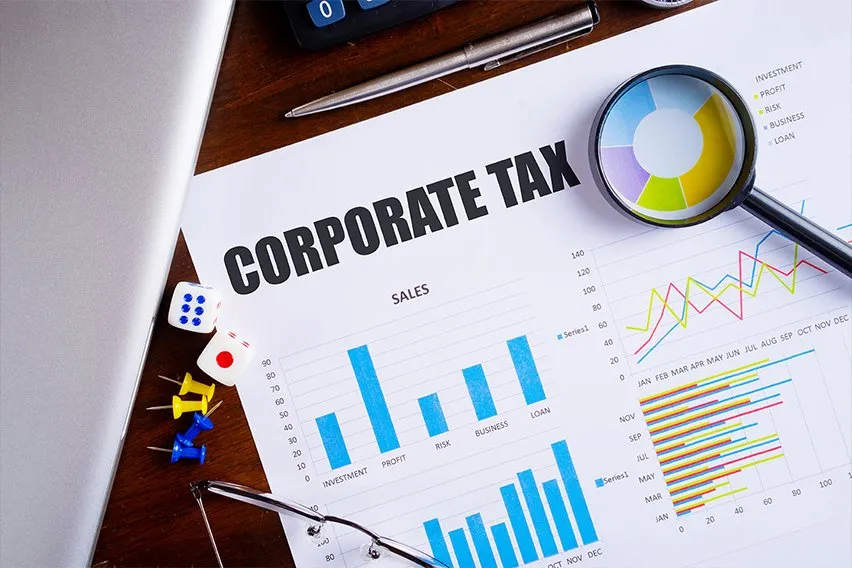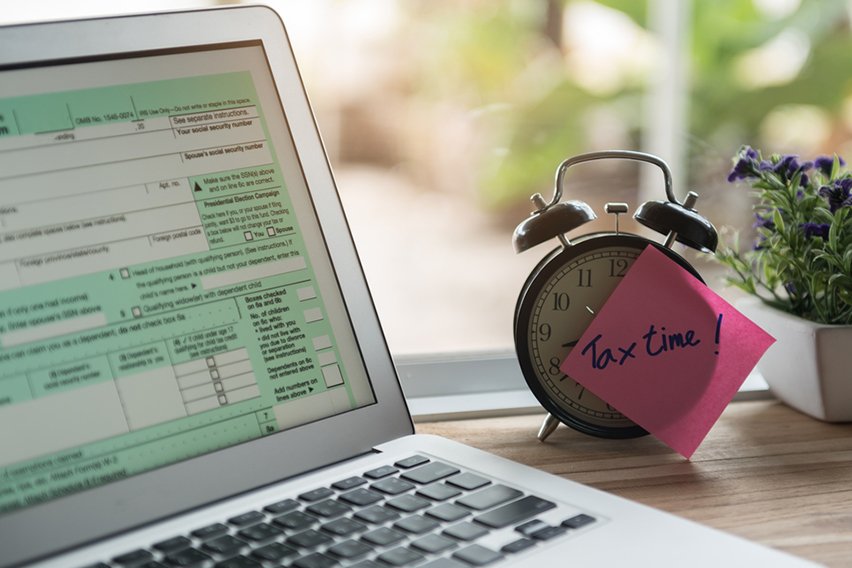What Is Corporation Tax? Definition & Calculation

Taxes are a part of any government and a part of any business. Corporation taxes in the UK are no different and operate much like income taxes. If you’re running a small company, understanding corporation tax is important to your business’s success. Learn all about corporation tax and corporate tax rates here!
Here’s What We’ll Cover:
How Do I Calculate My Corporation Tax?
How Do I Pay My Corporation Tax?
What if My Business is Dormant?
What Is Corporation Tax?
The definition of corporation tax is a tax that’s paid on any corporate profits. These profits are derived from running your business successfully. The businesses that fall under this category are:
- Limited liability companies
- Foreign companies with a UK branch or office
- Community clubs or co-operatives, or any other unincorporated association
Any of the above will have to pay the corporation business tax on the profits that they make. But what are those profits?

Profits That Require Corporation Taxes
The taxable profits for the corporation tax are made by your or your business. They are all listed below:
- Profits from “doing business” (also known as trading profits)
- Profits from investment income
- Chargeable gains (profits made from selling assets for more than their cost)
Both foreign corporations and domestic corporations are subject to these taxes. Domestic corporations are required to pay on all profits from the UK and abroad. Foreign corporations only pay on profits made in their UK locations and facilities.
How Do I Calculate My Corporation Tax?
Thankfully, calculating corporation tax is very easy. The corporate income tax rate is 19%. It is a flat corporate income tax that doesn’t change with your taxable income. For example, if you made a taxable profit of £10,000, then your corporation tax would be £1,900.
If your company sees operating losses rather than a profit, you may be able to apply that to last year’s taxes. When doing so, it’s possible to see a tax refund from the year prior paid back to you.
How Do I Pay My Corporation Tax?
HM Revenue and Customs authority will not send your company a bill for its corporation tax. Instead, it is the responsibility of the owner to submit all documentation for corporation tax annually. See the steps below for paying your corporate taxation.
Step 1: Register With HMRC
The first step for paying corporate taxes is registering your company with the HMRC. This consists of visiting the website and providing information to the HMRC. This information includes your Unique Taxpayer Reference (UTR) and the date you started doing business. It also includes the date your annual accounts are made up to.
The date that you started doing business is critical because it sets up your accounting period.
Step 2: Document and Prepare
Throughout the life of your business, you’ll need to keep accounting documents. This is especially important for corporation taxes. You’ll use your accounting documents to prepare your corporation tax return. Corporation returns are annual returns based on your accounting period. By filling out the corporation tax return, you’ll be able to calculate how much you need to pay HMRC.
Step 3: Report and Pay
After you’ve filled out your paperwork, you’ll know how much you owe, if you owe anything. If you’ve suffered from operating losses, seeing an overall loss, then you may not have to pay corporation taxes. Regardless, you still have to report your taxable income and profits to HMRC for the accounting period. Once your accounting period has ended, you’ll have 9 months and 1 day to report and pay your taxes.
Step 4: File Your Company Tax Return
The company tax return still has to be filed with HMRC. You have one year to do so following the end of your accounting period.

What if My Business is Dormant?
If you have stopped conducting business, then your business has gone dormant. In the event that your business has gone dormant, you’ll need to report it to HMRC. Businesses are only considered dormant once they have stopped trading and have no other income. Investments do count as a form of income that would prevent a business from going dormant. If you are unsure if your business is dormant, it’s best to speak with tax professionals to make sure. There are penalties if you don’t report as dormant, or if you aren’t truly dormant.
Key Takeaways
Corporation taxes are an easy tax to calculate. They are a flat rate for all companies, both foreign and domestic. The only thing that changes them is the place of business. Doing your corporate taxes is simple, and needs to be done annually.
If you need to know more about taxation, check out our resource hub. We have plenty of helpful articles for you and your business!
RELATED ARTICLES

 4 Best Furlough Calculators to Calculate a Coronavirus Furlough Claim
4 Best Furlough Calculators to Calculate a Coronavirus Furlough Claim Online Tax Return: Guide to File Self Assessment Tax Return
Online Tax Return: Guide to File Self Assessment Tax Return How to Register as Self-Employed in the UK? A Step-by-Step Guide
How to Register as Self-Employed in the UK? A Step-by-Step Guide What Is IR35? A Guide to Its Rule & Changes
What Is IR35? A Guide to Its Rule & Changes What Is the Emergency Tax Code? A Tax Code Guide
What Is the Emergency Tax Code? A Tax Code Guide 3 Best IR35 Calculator to Calculate IR35 Cost
3 Best IR35 Calculator to Calculate IR35 Cost